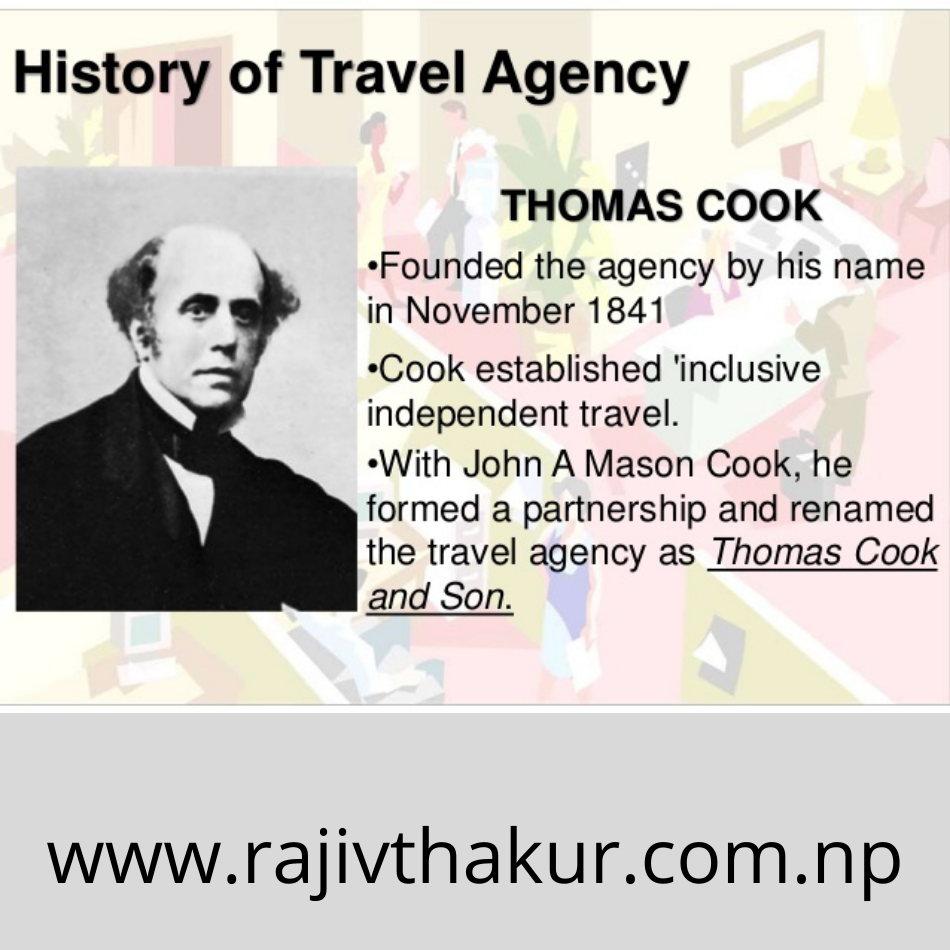Table of Contents
ORIGIN OF TRAVEL AGENCIES / EVOLUTION OF TRAVEL AGENCIES
Thomas Cook
The development of organized travel/ travel agencies as we know it today had its roots in the mid-nineteenth century and can be associated with a man known as Thomas cook. Any discussion on the sale and organization of travel must make reference to this pioneer. The history of the business of the present Thomas Cook Group Limited can be traced back to over 155 years to its founder Thomas Cook, who not only can be called the first organized travel agent in the world but who could be said to have invented the travel and tourism business as we know it today.
A Baptist preacher and a book salesman of Derbyshire was on his way to a temperance meeting in Leicester who he was inspired with the “idea of engaging a special train to carry the friends of temperance from Leicester to Loughborough in England and back to attend a quarterly delegate meeting.”
He thought that it was a sounder proposition to persuade a railway company, then its infancy, to carry a trainload of passengers at a very cheap fare than to run the train at ‘standard’ fares, but possibly only a quarter full. His idea was put into operation with characteristic speed and efficiency. A few weeks later 570 travellers made the journey by the Midland Counties Railway at a specially reduced fare. This venture was soon followed by excursions to various other places, and in 1843, 3,000 school children were taken on a trip from Leicester to Derby in England, perhaps the largest organized group of the time.
Thomas Cook’s real beginning as a ‘mass excursionist’ was, however, the Liverpool-Caernaryon trip of 1845. The tourists travelled by rail to Liverpool, from where they took a steamer to Caernaryon. The advertisements for the trip caused a sensation and the response was so overwhelming that a second trip had to be arranged. Cook thought of every detail. He made a preliminary survey of accommodation and facilities and produced a handbook of the trip to Liverpool.
The excursionist invasion of Scotland soon followed in 1846 and 1847. From 1848 to 1863 Cook conducted circular tours of Scotland, with 5,000 tourists a season, and with the citadels of the landed aristocracy falling before him, Cook saw more enticing prospects opening before him. “I had become so thoroughly imbued with the tourist spirit that I began to contemplate Foreign Trips, including the continent of Europe, the United States and the eastern lands of the Bible.”
Grand Circular Tour
By the mid-nineteenth century ‘Holiday away from Home’ had become customary for a larger social group than ever before. Cook’s initiative and organizing genius provided the final impetus.
In the winter of 1850-51, Cook was already negotiating for a tour of America, but his attention was diverted when he was offered the opportunity of conducting excursion trains to the Great Exhibition of 1851. Altogether, Cook conducted 1,65,000 people to and from the Crystal Palace. In 1856, Cook succeeded in organizing his first ‘grand circular tour of the continent’. The tour was so successful that it had to be repeated six weeks later.

Cook’s Conquest of Europe
Thomas Cook’s conquest of Europe began in 1862 when he made arrangements with Brighton and South Coast Railway for passenger traffic to the continent. It was the beginning of his conquest of Europe as a holiday destination and package tour. Cook’s Paris excursions are the first true ‘package tours’; all the details of transport and accommodation were pre-arranged. In 1863 Cook visited Switzerland where his ideas were greeted with enthusiasm by hoteliers and railway proprietors.
His next stop was Italy. Cook first made a personal survey of Turin, Milan, Florence and Genoa, to familiarize himself with their touristic attractions and facilities. In 1864 the first guided tour to Italy left England with applications far in excess of the available ticket. The 1860s also saw the introduction of Cook’s railway and hotel coupons. Cook personally examined the system by travelling through Italy to Vienna, down the Danube into Hungary and from there into Switzerland. By the 1890s 1,200 hotels throughout the world accepted his coupons. Starting in 1868 Cook arranged regular circular tours to Switzerland and Northern Italy.
Cook’s Overseas Efforts
Thomas Cook and Sons established their first official London Office in the year 1865. John Mason Cook now joined his father as a permanent partner and took charge of the London Office. From that year on, the history of Thomas Cook and Sons was one of continuous expansion. In the year 1880, John Mason Cook left for India and established offices in Bombay and Calcutta and formed the ‘Easter Princes’ Department in 1887, which arranged the visits of Indian princes to Queen Victoria’s Jubilee Celebrations.
Taking advantage of nineteenth-century advances in transport technology, Thomas Cook and Sons had effected a revolution in tourism by the end of the century. No longer the, preserve of the rich and the aristocrats, tourism was now an industry. Armed with Cook’s hotel and rail coupons, the tourist could demand uniform prices and standards of service and accommodation. This new standardization had distinct advantages. It meant to comfort and convenience and less need for decision making on the part of the individual tourist. The tourist was less likely to experience discomfort or embarrassment.
In the year 1898, the management of the company was passed on to John Mason Cook’s three sons. At the time of John Mason Cook’s death, the Cooks’ business included three main aspects of travel-selling tours, banking and shipping. Soon after the Second World War, the British government acquired the principal interest in the company. In the year 1972, the British government sold the company to Midland Bank Consortium.
Today, Thomas Cook Group is the parent company of a worldwide group of companies, which are partially or wholly owned. The company also has a close trading relationship with Companies International des Wagons-Lits et du Tourism, and the combined worldwide network of these companies, together with their authorized agents.
The company also introduced traveller’s cheques, which were originally called circular notes. Members of the Thomas Cook Group of Companies now issue cheques as principals in five currencies and are associated with partner banks in many more currencies. It is also a large trader in the buying and selling of foreign currency banknotes.
Today, Thomas Cook Group Limited provided a wide range of services to its customers in over 150 countries worldwide through its network of over 1,200 outlets. The company is considered to be one of the largest travel companies selling a wide range of travel services.
AMERICAN EXPRESS
The American Express Company also had its beginning in the year 1841. It is an interesting coincidence, that the world’s two largest travel companies are said to have their origins in the same year-1841. While Thomas Cook persuaded a railway company to carry a trainload of passengers at very cheap fares in that year, Henry Wells started his freight business in the USA at the same time. Henry Wells commenced his business initially as a shopper who later formed the well-known company of America known as Well Fargo. The American Express Company, popularly known today as AMEXO, is the world’s second-largest travel agency after Thomas Cook. Besides selling package tours, the company deals in travellers’ cheques.
The American Express Company is a major participant in international transactions, buying and selling huge amounts in foreign currency on each working day of a week. The company has also introduced American Express credit cards. These credit cards are very popular internationally. The services one can buy through these cards are varied and include the purchase of international air tickets, payment of hotel bills among many others. The cards have wide acceptance throughout the world. The company also handles services for various types of insurance, including travel insurance.
COX & KINGS
Cox and Kings is another company associated with the travel business. Although the company had its origin in the year 1758 earlier than when Thomas Cook came on the scene, the company’s activities initially were associated with the handling of the affairs of British officers stationed overseas.
The history of Cox and Kings Stretches back to the appointment by Colonel Lord Ligonier in 1758 of Richard Cox as the regimental agent to the Foot Guards. Cox & Co.’s efficient handling of the affairs of the officers stationed overseas was much admired and by 1878, their appointment as agent and banker had been extended to the household brigade, many of the cavalry and infantry regiments, the Royal Artillery and Royal Wagon Train. The company’s responsibilities increased steadily, including serving prestigious ships of the Royal Navy, the Royal Flying Corps and by the year 1918 the newly formed Royal Air Force.
With the rapid development of the British Empire, Cox & Co. expanded from its base in London to establish overseas offices. To service the garrisons spread throughout India, Cox and Co. entered into banking and later shipping and forwarding. Some of the more interesting assignments included the shipping of the Indian Sections of the Great London Exhibitions of 1851 and 1924, the movement of Wellington’s officers and logistics involved in the Chinese and African exhibitions.
By the year 1918, Cox & Co. had become an international corporation employing more than 4,500 people. In 1922 the company merged with Henry S.King, a banking concern. In 1923 the banking business was sold to Lloyd’s Bank and the Cox & Kings branch, s the company is known today, was opened. The fully integrated Anglo-Indian Company Cox & Kings today has a comprehensive network of local agents offering a wide range of travel services to their clients.
Much has changed since the year 1841 when Thomas Cook chartered a train to carry 570 travellers at a specially reduced fare from Leicester to Loughborough in England. Cook, who bought the railway tickets in bulk and resold them to members of his group, can be credited with being the first bona fide travel agent to work as a full-time professional. However, neither Thomas Cook & Sons nor American Express Company or Cox & Kings were then retail agents, as the modern complex distribution chain had not yet evolved in any trade including travel.









